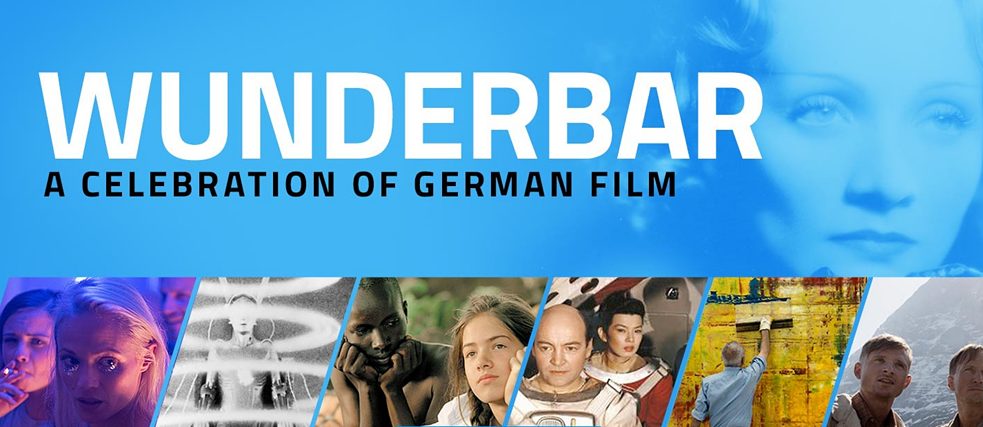As a part of a year-long project "Wunderbar: A Celebration of German Film," the Goethe-Institut Washington has selected twelve iconic films that trace the richness of German film history. Together with Landmark's West End Cinema, we present German Cinema 101, a series that guides viewers through this history, paired with expert-led discussions.
Not able to make it to the cinema? No worries! You can also stream this film and 48 films in total with the link at right.
THE MARRIAGE OF MARIA BRAUN (DIE EHE DER MARIA BRAUN)
An introduction to the film will be provided by Sky Sitney, co-director of film festival Double Exposure and Assistant Professor in the Film and Media Studies program at Georgetown University. A discussion will follow the screening.
Federal Republic of Germany, 1979, 115 min., Director: Rainer Werner Fassbinder, Screenplay: Werner Fassbinder, Pea Fröhlich, and Peter Märthesheimer
In post-World War II reconstruction West Germany, Maria Braun learns that her husband has died during the war. Desperate and determined, she supports herself by working as a hostess at a bar frequented by American soldiers. From there, she begins ascending the social ladder, ultimately garnering the attention of a wealthy industrialist. Maria continues her progress by becoming his mistress, but her ambitions are complicated when she learns that her husband may not have died after all. At what cost will she be able to reconcile her love for her husband with her need to survive in a postwar West Germany that is struggling to rebuild itself? Her eventual downfall coincides ironically with Germany’s victory in the 1954 World Cup, a historic landmark highlighting Germany’s “comeback” as a world power.
Rainer Werner Fassbinder (1945 – 1982) was born into a cultured bourgeois family in the small Bavarian spa town Bad Wörishofen. Raised by his mother as an only child, the boy had only sporadic contact with his father, a doctor, after the divorce of his parents when he was five. Educated at a Rudolf Steiner elementary school and subsequently in Munich and Augsburg, the city of Bert Brecht, he left school before passing any final examinations. A cinema addict (“five times a week, often three films a day”) from a very early age, not least because his mother needed peace and quiet for her work as a translator, “the cinema was the family life I never had at home.”
Fassbinder made his first short films at the age of twenty, persuading a male lover to finance them in exchange for leading roles. He also applied for a place at the Berlin Film School (dffb), but was refused. He acted in both his early films:
Der Stadtsreicher (
The City Tramp), which also featured Irm Hermann (later often used in character roles); and
Das kleine Chaos (
The Little Chaos). In the latter, his mother – under the name of Lilo Pempeit – played the first of many parts in her son’s films. Only after these amateur directing-scripting-acting efforts did Fassbinder take lessons with a professional acting studio, where he met Hanna Schygulla, his most important actress, who thanks to him became an international star. It was through Schygulla that Fassbinder turned his interest to the theatre.
His flamboyant and at the same time seedy lifestyle, his openly displayed and well advertised homosexuality, and at the same time life and love to women, the scandals, public outrages and bouts of self-pity ensured that in Germany itself Fassbinder was permanently in the news, making calculatedly provocative remarks in interviews, which nonetheless were usually shrewd and to the point. His work often received mixed notices from the national critics, many of whom only began to take Fassbinder seriously after the foreign press had hailed him as a genius.
Buy Tickets
Are you currently enrolled in a German course at the Goethe-Institut Washington? If so, pick up your free ticket from the front desk today!
This event is part of the
German Cinema 101 film series. German Cinema 101 is part of the project
Wunderbar: A Celebration of German Film. From
Beloved Sisters to
A Coffee in Berlin and
Young Goethe in Love, from
The Blue Angel to
The Cabinet of Dr. Caligari — we are celebrating German-American friendship with our partner Kanopy by bringing 48 German films to your screens. Goethe-Instituts and Goethe Pop-Ups across the U.S. will take part in the celebration by showing films, organizing film festivals, and inviting German filmmakers to speak.
 © Kanopy
© Kanopy
Back